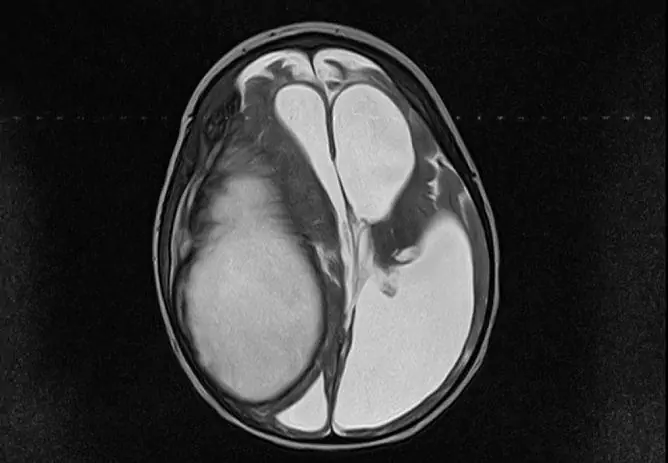- Author Rachel Wainwright wainwright@abchealthonline.com.
- Public 2023-12-15 07:39.
- Last modified 2025-11-02 20:14.
Sarcoma

The name of the disease sarcoma comes from the Greek word "sarcos", which literally means "meat". Sarcoma unites a large group of malignant neoplasms. A distinctive feature of sarcoma is its non-epithelial origin. The disease originates from primary connective cells - derivatives of the mesoderm, from which, as a result of complex histological and morphological processes, a malignant tumor formation develops, containing cellular elements of tendons, ligaments, bones, blood vessels, muscles, meninges, etc.
As a rule, sarcoma occurs at a fairly mature age, the majority of patients are over twenty-five years old. Among all forms of tumors, sarcoma accounts for more than 15 percent of cases of malignant neoplasms.
Sarcoma causes
It is customary to associate the causes of sarcoma with oncogenic substances, as well as with active ionizing radiation, the effect of which causes the rapid growth of unusual cells uncharacteristic for the original tissue type, referred to by specialists as poorly differentiated or atypical.
In addition, modern scientists have established data on the pathogenic effect of certain viruses and certain chemicals. Today, there are unequivocally proven facts that, for example, prolonged contact with a chemical such as vinyl chloride causes the formation of angiosarcoma of the liver, and oncogenic viruses contribute to the appearance of a special type of malignant tumors - soft tissue sarcomas.
Types of sarcoma
All existing types of sarcoma (of which today there are slightly less than a hundred nosological, completely independent types) are subdivided according to the cellular identity of the tumor and according to its histological structure.
A large group of diseases, collectively called bone sarcoma, includes the following subspecies:
- chondrosarcomas;
- osteosarcomas;
- fibrosarcomas;
- round cell sarcomas - neurosarcomas, Ewing's sarcomas, bone lymphosarcomas, etc.
Soft tissue sarcomas are divided into the following clinical and morphological options:
- angiosarcomas
- synovial sarcomas;
- liposarcomas;
- neurogenic sarcomas;
- myogenic sarcomas, etc.
In addition, sarcomas of complex cellular composition are distinguished into a separate group, which, due to the low degree of cell differentiation, cannot be unambiguously attributed to one or another type.
Sarcoma symptoms
The clinical manifestations and symptoms of sarcoma, as well as the characteristics of the course of the disease, depend on the type of initial cell tissue and on the localization of the neoplasm. For the vast majority of sarcomas, a typical symptom is the appearance of a tumor that is rapidly increasing in size.
In bone sarcoma, the first sign of the disease is the occurrence of nocturnal bone pain of unexplained etiology. As a rule, pain syndrome is not stopped by taking painkillers; over time, the pain in the affected part of the bone continues to increase. Further pathological growth of tumor tissue begins to invade the surrounding organs, causing secondary symptoms of sarcoma, corresponding to the location and extent of the lesion.
Sarcomas also differ in the speed of spread. For example, parostal bone sarcomas progress very slowly. This type of malignant tumor can exist practically without external manifestations for a very long time. On the contrary, other types of neoplasms (for example, rhabdomyosarcoma) tend to actively grow and spread metastases. Certain types of sarcomas (such as liposarcomas) are characterized by the multiple nature of primary education, which greatly complicates their diagnosis and the appointment of timely treatment of sarcoma.
Sarcoma treatment

Prerequisites for the successful treatment of any type of sarcoma are early diagnosis and a comprehensive therapeutic approach.
Until recently, the only method of treating sarcoma was the operative method, that is, surgical excision of the tumor formation. But today new methods are effectively used to treat this serious illness - radiation therapy and modern anticancer drugs.
A potential prognosis in the treatment of sarcoma can be made taking into account a combination of many factors, the main of which is the stage of the disease. With early diagnosis, most types of sarcomas can be successfully treated with modern medical methods.
YouTube video related to the article:
The information is generalized and provided for informational purposes only. At the first sign of illness, see your doctor. Self-medication is hazardous to health!






